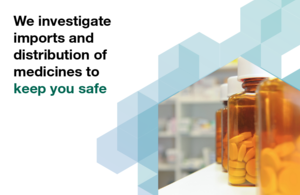London medicines wholesaler sentenced for illegally importing and distributing over £2.9m of medicines
The owner of a medicines wholesale business was sentenced yesterday at Southwark Crown Court to 20 weeks imprisonment, suspended for 12 months and community service

Bottle of pills
The owner of a medicines wholesale business was sentenced yesterday at Southwark Crown Court to 20 weeks imprisonment, suspended for 12 months and community service after pleading guilty on 20 June 2022 to importing and distributing medicines worth over £2.9m sale value without holding the correct licences
Between July 2017 and June 2018, Amr Mosa (36), director of Wimpole Pharmacie Ltd in London’s West End, imported medicines such as Herceptin, Avastin and Enbrel [1] from Egypt to the UK and then distributed them from the UK to a company based in Germany [2].
These medicines are prescription-only medicines to treat conditions as diverse as cancers and Crohn’s disease, that require storing at low temperatures. These are known as cold chain products.
Although Mosa’s company was granted a licence to distribute medicines within the European Economic Area (EEA) [3], the licence did not authorise the distribution of cold chain products, nor did it allow these to be imported into the UK from outside of the EEA.
In August 2018, the European Medicine’s Agency’s Rapid Alert Notification system flagged that a batch of medicines supplied to Germany by Wimpole Pharmacie Ltd had originally been stolen from Italian hospitals.
In response, the MHRA investigated the business and proved that the drugs were imported and exported without the correct licences, allowing unauthorised medicines to enter the European market.
The defendant was sentenced to a total of 20 weeks imprisonment, suspended for 12 months as well as 100 hours of unpaid work [4].
Andy Morling, Deputy Director of Criminal Enforcement at the MHRA, said:
It’s a serious criminal offence to import and distribute medicines without the right licences. We work closely with regulatory and law enforcement partners to identify and bring to justice those who fall short of legal compliance.
It’s important that all suppliers understand and follow the regulatory requirements around importing and distributing medicines and medical devices. If not, they could fail to meet our safety standards, endangering patient health.
While there is no evidence that these medicines posed a risk to patients, they had been stolen from hospitals in Italy before being imported from Egypt. This case illustrates that failing to comply with the regulations and conditions of the relevant licences can have serious consequences.
We will investigate any report of suspected illegal activity involving medicines and medical devices so that patients can be confident their medication and medical devices are acceptably safe.
Notes to Editor
[1] The medications the defendant did not have the correct licences for importing or distributing were: Avastin, Enbrel, Eylea, Faslodex, Herceptin, Humira, Kadcyla, Lucentis Neulasta, Nexavar, Opdivo, Perjeta, Soliris, Stelara, Sutent, Velcade and Xgeva. These are prescription-only medicines that are used to treat cancers, arthritis, and Crohn’s disease among others.
[2] Between 12 July 2017 and 9 June 2018, Wimpole Pharmacie Limited imported 4484 packs of various medicines, the total purchase price of which was £2,744,184 and sold them for £2,968,069, for a profit of £223,885.
[3] The European Economic Area includes EU countries as well as Iceland, Liechtenstein and Norway. It allows them to be part of the EU’s single market. For more information, see the gov.uk page
[4] On the first count of importing medicinal products contrary to regulations, he was sentenced to 20 weeks imprisonment suspended for twelve months and 100 hours of unpaid work. On the second count of distributing medicinal products contrary to regulations, he was sentenced to 20 weeks imprisonment suspended for twelve months and 100 hours of unpaid work, to be served concurrently. Therefore, he was sentenced to 20 weeks in total and 100 hours of unpaid work in total.